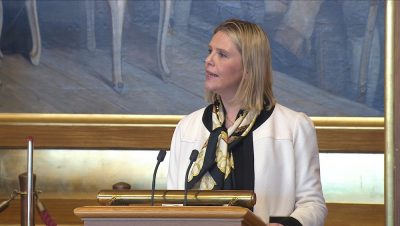UPDATED: Norway’s Immigration Minister Sylvi Listhaug warned the Norwegian Parliament in the strongest of terms on Wednesday against halting returns of refugees from Afghanistan who fail to qualify for asylum. The deportations of Afghans are controversial, especially when they involve young refugees as soon as they turn Norway’s legal age of 18, but Listhaug warned of “unwanted consequences” if they’re stopped. A majority of Members of Parliament later agreed.

“Norway will become even more attractive if there’s a halt in returns,” Listhaug said after being called in to address Parliament on the thorny issue. Members of Parliament had demanded an evaluation of the practice from Listhaug and of the overall security situation in Afghanistan from Foreign Minister Ine Eriksen Søreide, who formerly served as Norway’s defense minister.
“It’s important that decisions (on asylum applications) are based on a strong foundation of facts,” Listhaug, from the conservative Progress Party, told the MPs. “This has nothing to do with whether you’re kind and cooperative, but whether you have need for protection. We can’t undermine the asylum system.”
After an afternoon of debate, a majority of the parties in Parliament turned down a proposal from the Socialist Left party to suspend the forced returns. Labour and the Center Party supported Listhaug’s and the government’s position and blocked efforts to block refugee returns.
Security paradox dismissed
Norwegian Broadcasting (NRK) reported on how Listhaug was confronted with the paradox of how Afghanistan is viewed safe enough to send 18-year-olds back, while Norway’s own foreign ministry warns Norwegians against traveling to Afghanistan for security reasons.
“That’s two different things,” Listhaug responded. “I think most people understand that being a Norwegian tourist in Afghanistan is something most should avoid, but if you’re born and reared there, it’s another story.” She claimed that bringing the ministry’s travel warnings into the debate was a means of derailing it.
Norway’s minority conservative government has been under pressure not only within the country but also internationally for its quick deportations of those found unworthy of asylum. The practice of offering underage asylum seekers residence permission only until they turn 18 has been criticized by judges in France and elsewhere in Europe, and many have found it inhumane.
Listhaug argues that the government’s policy is firm and fair, and that Norway simply has a more efficient system of returning rejected refugees. Frode Forfang, head of Norway’s immigration agency UDI (Utlendingsdirektoratet) seemed to agree in a commentary published in newspaper Aftenposten Wednesday morning.
Returned refugees ‘at no more risk than others’ in Afghanistan
“Most European asylum authorities believe that many asylum seekers can be returned to Afghanistan, but Norway has a more efficient system than most other countries to carry out returns,” Forfang wrote. He admitted that the security situation in Afghanistan has “developed in a negative direction in recent years,” but he argued that those returned to the country are no more vulnerable to terrorist attack than everyone else already there. The risk of being a victim in the ongoing conflicts in Afghanistan is the same, he wrote, as it is for other parts of civilian society.
Forfang noted that Norwegian authorities are aided in their evaluation of asylum applications by a professional called Landinfo, which offers analyses and reports on countries that asylum seekers have fled. He described Landinfo as a credible source of information about factual conditions. Forfang also wrote that disagreement among immigration authorities is usually based on asylum policies, and evaluations of what’s “safe enough” to allow returns.
He conceded that the policy UDI must follow now meets the lowest demands posed under international obligations. “Norway is on the right side of the obligations, but with narrower margins than it was before,” Forfang wrote. That’s a reflection of the conservative government’s tightening of immigration rules and asylum practices.
NATO sending reinforcements
Meanwhile, former Norwegian Prime Minister Jens Stoltenberg, now secretary general of NATO, announced this week that the security situation in Afghanistan has worsened following a series of terrorist attacks including one on a TV station on Tuesday. Foreign Minister Eriksen, who worked closely with NATO as defense minister, was expected to agree.
“The past few weeks have been difficult in Afghanistan,” Stoltenberg said, “with a string of brutal and meaningless attacks.” He said the US is already boosting its presence in Afghanistan and other allies are also sending more troops during the next few months, “to support Afghanistan’s efforts against international terrorism and in favour of peace and reconciliation.” Norway will be sending around 10 more special forces officers to help train Afghan police.
newsinenglish.no/Nina Berglund

